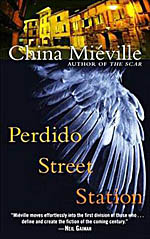
![]() Rabindranauth@DDR
Rabindranauth@DDR
7/2/2014
![]()
One of the most impressive feats of imagination you'll ever experience. And definitely worth the read on, at the very least, those grounds.
When Yagharek the garuda loses his wings, all roads lead to the vile, diseased, necrotic city called New Crobuzon. And to Isaac Dan der Grimnebulin, the fringe scientist who may be his only hope of one day flying again. But in the course of his research into flight, Isaac unwittingly unleashes a terrible force on New Crobuzon, a force for which the entire city is a ripe hunting ground.
I've heard this book lauded far and wide, and you know what? I found it a mixed bag.
New Crobuzon is portrayed as a fetid, dessicated, putrescent, corrupt city, where the government essentially rules with an iron fist, politicians championing causes for the people that all spring from personal motives or for personal rewards. Dissension and sedition are dealt with swiftly, brutally, and with no mercy. The vast majority of citizens are live in squalor, segregated poverty, and the military ensures the rich stay on top. Crime is an ally of the government, as long as a cut makes its way into the right pockets. It's a setting that was extremely overpowering; by three hundred pages I was looking for absolutely anything bright and cheerful about this city. I finally found a two line instance of this almost at the very end of the book, where the water just above the bed of a river was described as clear and pure. Granted, this was under a thick layer of sewage and pollution, but I'll take it.
The most interesting character in here for me was easily the Weaver. A giant extradimensional spider so named because he spins the tapestry of space and time, ensuring the weave of the world has a nice pattern as he alone decides. What's not to love? The Weaver is called on many times in the book, despite the fact he's clearly on his own side. By the end of the book it's clear he sees people only in terms of their places in the world weave, and he only acts in their benefit or detriment if he thinks it'll produce a pattern aesthetically appealing to himself. What does that mean? The Weaver's as likely to cut your left ear off as to play tic-tac-toe with you. Literally.
As to the other characters, they're all a mix for me. They all had moments when they shined, moments when I was gripped by them, and moments when I could care less if they existed, that are sprinkled at various points over the course of the story. Isaac in particular I liked reading about; his easy love for science really made him sympathetic. Yagharek was a bit too broody for me, but it would have been very out of character for him not to be, I think, so it's a case where it's just not for me.
Perdido Street Station is a book that's been lauded in fantasy circles as an amazing tale, and I have to agree with that. But it is a tale with flaws, just like any other. I definitely had a few issues with it.
The first is definitely the pace. Perdido Street Station is extremely creative, genre defying, and interesting, but it's also a slow tale. A dense, slow one. It took two hundred pages and the hatching of a cocoon for me to finally sit up and start reading in earnest. Events definitely picked up after the cocoon hatched, but at the same time there were parts that felt just as slow as the start. Mieville gets caught up portraying the richly decaying New Crobuzon and its fetid inhabitants, and it really detracts from the story overall for me.
Mieville's writing once again steals the show. It's richly descriptive, easily bringing the story to life and allowing me to imagine every nook and cranny of New Crobuzon and its various, alien inhabitants. But there are many parts I could have done without, scenarios that really add to the richness but are pointless tangents to the story overall. It only happens a few times, but enough to be irksome. At points it really began to feel redundant; the stage was well set already by Mieville continued to rehash certain points of the worldbuilding in later sections of the book. These generally led to my sense of the book slowing down in the later half, at times.
Overall, I have to say it was an extremely interesting read. Mieville effortlessly combines fantasy, sci fi and horror to create an ultimately riveting tale. It wasn't cheap entertainment, but it's not as heavy as Lord of the Rings either [Yea, I had to go there, in a Mieville review]. The star of the show is easily his rampant imagination; three quarters the fun I got out of reading this book was absorbing the creativity of it all. It's a book I regret not reading sooner, I can definitely say that. But at the same time it's not a book I'd advise you drop your planned reads to go and read right now. Proceed as you will, but definitely make it a must read.
http://drunkendragonreviews.wordpress.com/